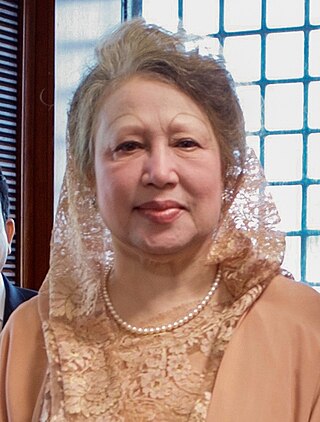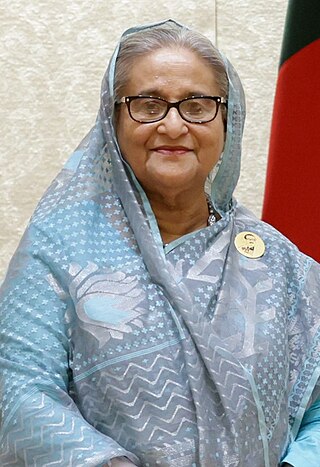
Politics of Bangladesh takes place in a framework of a parliamentary representative democratic republic, whereby the Prime Minister of Bangladesh is the head of government and of a multi-party system. Executive power is exercised by the government. Legislative power is vested in both the government and parliament. The Constitution of Bangladesh was written in 1972 and has undergone seventeen amendments.

The Bangladesh Nationalist Party is a major political party in Bangladesh. Founded on 1 September 1978 by Bangladeshi president Ziaur Rahman with a view of uniting people with a nationalist ideology, BNP later became one of the two dominant parties in Bangladesh, along with its archrival Awami League. Initially a big tent centrist party, it later moved towards more right-wing politics.

Begum Khaleda Zia is a Bangladeshi politician, who served as the Prime Minister of Bangladesh from 1991 to 1996 and again from 2001 to 2006. She was the first female prime minister of Bangladesh and second female prime minister in the Muslim world, after Benazir Bhutto. She is the widow of one of the former President of Bangladesh, Ziaur Rahman. She is the chairperson and leader of the Bangladesh Nationalist Party (BNP) since 1984, which was founded by her husband in 1978.

The Prime Minister of Bangladesh, officially Prime minister of the People's Republic of Bangladesh, is the chief executive of the government of Bangladesh. The prime minister and the cabinet are collectively accountable for their policies and actions to the Parliament, to their political party and ultimately to the electorate. The prime minister is ceremonially appointed by the president of Bangladesh.

Sheikh Hasina is a Bangladeshi politician who served as the tenth prime minister of Bangladesh from June 1996 to July 2001 and again from January 2009 to August 2024. She is the daughter of Sheikh Mujibur Rahman, the first president of Bangladesh. She served in the position of prime minister for over 20 years, making her the longest-serving prime minister in history of Bangladesh. Thus, she became the world's longest-serving female head of government. Her authoritarian regime ended in self-imposed exile following an uprising in 2024.

General elections were held in Bangladesh on 1 October 2001. The 300 seats of the Jatiya Sangsad were contested by 1,935 candidates representing 54 parties and 484 independents. The elections were the second to be held under the caretaker government concept, introduced in 1996.

The 2006–2008 Bangladeshi political crisis began as a caretaker government (CTG) assumed power at the end of October 2006 following the end of the Bangladesh Nationalist Party administration. The BNP government increased the chief justice's retirement age in an unconstitutional way to bias the appointment of the head of the caretaker government. CTG manages the government during the interim 90-day period and parliamentary elections. Political conflict began with the alleged appointment of a Chief Adviser, a role which devolved to the President, Dr. Iajuddin Ahmed. The interim period was marked from the beginning by violent protests initiated by the Awami League named Logi Boitha Andolan, with 40 people killed and hundreds injured in the first month. The Bangladesh Nationalist Party had its own complaints about the process and the opposition.
General elections were held in Bangladesh on 27 February 1991. The Bangladesh Nationalist Party (BNP) emerged as the largest party in parliament, winning 140 of the 300 directly elected seats. The BNP formed a government with the support of Jamaat-e-Islami Bangladesh and on 20 March Khaleda Zia was sworn in for her first term as Prime Minister.

General elections were held in Bangladesh on 12 June 1996. The result was a victory for the Bangladesh Awami League, which won 146 of the 300 directly elected seats, beginning Sheikh Hasina's first-term as Prime Minister. Voter turnout was 75%, the highest to date. This election was the second to be held in 1996, following controversial elections held in February a few months earlier.

General elections were held in Bangladesh on 15 February 1996. They were boycotted by most opposition parties, and saw voter turnout drop to just 15%. The result was a victory for the Bangladesh Nationalist Party (BNP), which won 278 of the 300 directly elected seats. This administration was short-lived, however, only lasting 12 days before the installation of caretaker government and fresh elections held in June.

A caretaker government of Bangladesh, is an unelected interim government in Bangladesh tasked with organizing free and fair general elections. The Chief Adviser, the head of government in lieu of the Prime Minister, is appointed by the President. The Chief Advisor appoints other advisers, who act as ministers. The appointments are intended to be nonpartisan.

The history of Bangladesh (1971–present) refers to the period after the independence of Bangladesh from Pakistan.

General elections were held in Bangladesh on 5 January 2014, in accordance with the constitutional requirement that elections must take place within the 90-day period before the expiration of the term of the Jatiya Sangshad on 24 January 2014.

Islami Andolan Bangladesh, abbreviated as IAB, is a major Deobandi Islamist political party in Bangladesh. It was founded in 1987 by Fazlul Karim as Islami Shashontantra Andolan, and took its current name in 2008. The party maintains distance from both of the dominant parties in Bangladesh, Awami League and Bangladesh Nationalist Party. In the recent years, the party has gradually done well in the local government elections. The number of votes of the party has increased also in the national polls.
An interim government led by the Shahabuddin Ahmed ministry was formed on 9 December 1990 in Bangladesh, following President HM Ershad's resignation on 6 December in the face of a mass uprising against his regime. Shahabuddin had taken office as the acting president of the country after he was unanimously agreed upon by the leaders of all political parties to be ceremoniously appointed by Ershad just before resigning as vice-president in place of Moudud Ahmed. He administered the oath of office to his council of advisers at Bangabhaban on 9 December 1990. During this period, he gave back freedom of the press by amending a number of law including the Special Powers Act.

General elections were held in Bangladesh on 7 January 2024 in accordance with the constitutional requirement, stating that elections must take place within the 90-day period before the expiration of the current term of the Jatiya Sangsad on 29 January 2024. The Awami League, led by incumbent Sheikh Hasina, won the election for the fourth consecutive time with less than 10% of the eligible voters voting according to an Election Commission, which is run by the ruling political party. The party won 224 seats while independent candidates, most of whom were Awami League members propped up as dummy candidates to give a semblance of competition, won 62 seats.
The following is a list of scheduled and expected events for the year 2024 in Bangladesh. 2024 (MMXXIV) is the current year, and is a leap year starting on Monday of the Gregorian calendar, the 2024th year of the Common Era (CE) and Anno Domini (AD) designations, the 24th year of the 3rd millennium and the 21st century, and the 5th year of the 2020s decade.

General elections are held in Bangladesh to elect members of the Jatiya Sangsad, the unicameral national parliament. The Jatiya Sangsad consists of 300 members elected by first-past-the-post voting in single-member constituencies and 50 seats reserved for women, which are allocated based on the proportional vote share received by parties. Elections are overseen by the Bangladesh Election Commission.

The fifth inauguration of Sheikh Hasina as Prime Minister of Bangladesh took place on 11 January 2024, after Hasina and her party won the 2024 Bangladeshi general election. The oath of office was administered by President Mohammed Shahabuddin. The Fifth Hasina ministry was formed. The 12th Jatiya Sangsad was also formed. Following the Non-cooperation movement, Hasina resigned from office and fled to India. This led to Muhammad Yunus being sworn in as Chief Adviser on 8 August. As of 6 August, she has been living in a secret location under tight security in India.
Mushfiqul Fazal Ansarey, also spelled Mushfiqul Fazal Ansari, On 21 October 2024, the Ministry of Public Administration of Yunus' interim government appointed him as ambassador for three years. He is an Senior Secretary of Bangladesh government and Washington DC–based Bangladeshi journalist known for asking questions at the press briefings of the United States Department of State. He is a permanent correspondent of the United Nation headquarters. He was the assistant press secretary to Prime Minister Khaleda Zia. He was a well known critic of former Prime Minister Sheikh Hasina.









































